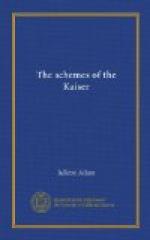One cannot speak of the East without feelings of shame and heartfelt indignation. In Turkey’s stolid resistance to reform, in her massacres, in the Cretan revolt, and in the war between her and Greece, William II has seen only an opportunity of gain for himself. He has cynically pursued his policy of profit-snatching. Just as certain quacks demand a higher fee when they prescribe for a patient whose life is in serious danger, so William II exacts heavier payment from his client. His demands are exorbitant: trade, finance, armaments, concessions, sale of arms, renewal of munitions of war, rebuilding of the fleet, etc., etc.
The King of Prussia continues, without ceasing and at his own sweet will, to utter defiance to common sense and to the general direction of civilised opinion. Whilst by his policy he supports the foul murderer of Christians and prepares the way for fresh butcheries on the return of the victorious Turks from Thessaly, William II has addressed these astounding words to the recruits of his Royal Guards: “He who is not a good Christian, is not a brave man, nor a worthy Prussian soldier, and can by no means fulfil the duty required of a soldier in the Prussian army.”
December 10, 1897. [21]
Germanism, which up till 1870 had a certain sense of decent restraint, and took the trouble to disguise itself skilfully under Bismarck, no longer knows either limitations or scruples. It displays itself without shame, secure in the hesitancy of the Slav and the weakness of the Latin peoples. Who could fail to be roused to indignation by the display of German fanaticism which has taken place at Vienna? To think that in the capital of an ally of William II, a faction, relying on advice publicly given in Berlin should shout in the Reichsrath, overthrow a ministry, disturb the public peace in the streets, and accompany these manifestations with Prussia’s national song, “Die Wacht am Rhein,” and the display of the German flag! If scandalous proceedings such as these make no difference in the relations of the Triple Alliance, why wonder at the audacity and pride of the Teutons?
Everything is a matter of exclusive right for the German. There are no other rights but German rights, and when Germany claims the exercise of a right, neither numbers, nor nationalism, nor races have any existence, confronted by the individuality, the nationalism, of the German race. Mommsen, the leading historian of Prussian Germany, wrote in the Neue Freie Presse of Vienna, “Pummel the heads of the Czechs with your fists,” whereat all the Austrians of German race applauded, loudly declaring that if it came to a question between the Germans of Prussian Germany and Austrian subjects of Slav extraction, their sympathies would not be in doubt, for they, although Austrians, saw on the one side their brethren of a superior Kultur, and, on the other, barbarians only fit to remain for ever oppressed.




